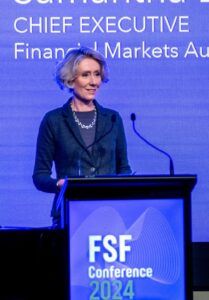At the Financial Services Federation conference, Samantha Barrass introduced herself as the Chief Executive of the Financial Markets Authority (FMA). She shared her journey of moving from the UK to Christchurch as a child and spending 20 years in the UK and Europe before returning to New Zealand in 2022 to lead the FMA. Samantha noted the continuous excitement and challenges of heading a financial regulator, especially with the significant regulatory changes in recent years. She highlighted the FMA’s expanding remit, including the new financial advice regime, climate-related disclosure standards, the upcoming conduct of financial institutions legislation, and the transfer of responsibility for credit law from the Commerce Commission to the FMA.

Samantha Barrass highlighted the Financial Markets Authority’s growing relationship with non-bank lenders and finance companies during the conference. She emphasized the importance of lenders in enabling New Zealanders to borrow for essential needs and life goals. The FMA aims to ensure that customers are treated fairly and that financial service providers act with integrity. She also noted that recent changes announced by Minister Bayly will need to go through legislation, which has not yet been introduced. She emphasized that until the new law is passed, the Commerce Commission remains the regulator for the CCCFA. Although the FMA is increasing its engagement activities and working closely with the Commission to ensure a smooth transition, businesses should continue to work with the Commission as usual until the transfer is official.
She introduced the FMA and what to expect from it as a regulator. The FMA, established after the Global Financial Crisis to address longstanding issues in the financial sector, is relatively young. The collapse of finance companies during that time exposed significant risks and harms, underscoring the need for regulation to protect investors and ensure robust capital markets in New Zealand. The FMA was created to meet these needs.

Samantha Barrass emphasized that the CCCFA transfer is about more than just moving roles around; it’s aimed at simplifying the regulatory landscape by having a single conduct regulator for financial markets. She highlighted that as a conduct regulator, the FMA uses different regulatory tools compared to the Commission’s role as a competition and consumer regulator.
The Financial Markets Conduct Act, along with other laws, provides the FMA with a broad range of tools for flexible and proportionate regulation. This includes oversight of financial advice providers, registered banks, non-bank deposit takers, insurers, and soon, non-bank lenders and finance companies.
She also noted that the Minister has proposed replacing the certification regime with a market services licence as part of the CCCFA transfer. Legislation will ensure that certified firms automatically receive this new licence once the law is in force. The goal is to make the transition smooth and reduce regulatory and compliance costs from the start.
Source: www.fma.govt.nz

